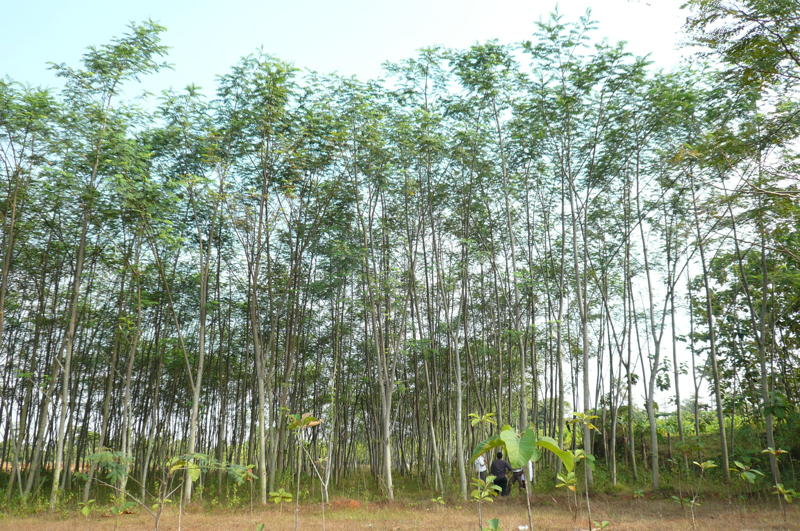
Albizia
Albazia, botanic name, Paraserianthes falcataria (L.) Nielsen, locally known as Sengon, is one of the most important pioneer multipurpose tree species in Indonesia. It is one of the tree species preferred for industrial forest plantations in Indonesia because of its very fast growth, its ability to grow on a variety of soils, its favourable silvicultural characteristics and its acceptable quality of wood for the panel and plywood industries. Albizia plays an important role in both commercial and traditional farming systems in many sites in Indonesia.
P. falcataria grows so fast that it is sometimes called the “miracle tree”. It is even mentioned in the Guinness Book of Records as the world’s fastest growing tree. On good sites it can attain a height of 7 m in just over a year. Albizia is a large tree that can grow up to 40 m tall with the first branch at a height of up to 20 m. The tree can grow to 100 cm or sometimes more in diameter, with a spreading flat crown. When grown in the open, trees form a large umbrella-shaped canopy.
Albizia is native to Indonesia, Papua New Guinea, Solomon Islands and Australia. Natural stands of P. falcataria are scattered around the eastern part of Indonesia (i.e. South Sulawesi, Maluku and Papua). Albizia can grow on a wide range of soils. It does not require fertile soil; it can grow well on dry soils, damp soils and even on salty to acid soils as long as drainage is sufficient.
In West Java, where growing conditions are optimal, P. falcataria is one of the important commercial timber species used for both the pulp and paper industry and furniture. The wood is also suitable for general purposes such as light construction (e.g. rafters, panelling, interior trim, furniture and cabinetwork), lightweight packing materials (e.g. packages, boxes, cigar and cigarette boxes, crates, tea chests and pallets), matches, wooden shoes, musical instruments, toys, novelties and general turnery. The wood is an important source of lightweight veneer and plywood and is very suitable for the manufacture of light- and medium-density particleboard, wood- wool board and hardboard as well as block-board. The wood is extensively used for the manufacture of rayon and for supplying pulp for the manufacture of paper (Soerianegara and Lemmens 1993).
As a nitrogen-fixing species, P. falcataria is also commonly planted for reforestation and afforestation to improve soil fertility (Heyne 1987). The natural drop of leaves and small branches contributes nitrogen, organic matter and minerals to the upper layers of soil (Orwa et al. 2009). The trees are sometimes interplanted with agricultural crops such as corn and cassava and fruit trees (Charomaini and Suhaendi 1997). They are often planted in home gardens for fuelwood (charcoal), and the leaves can be used as fodder for chickens and goats. The bark is reported to serve as tannin nets in Ambon (Maluku), and is sometimes used locally as a substitute for soap. The trees are also planted as windbreaks and firebreaks. They have been used as ornamental and shade trees planted along the sides of the highway from the Indonesian capital Jakarta to the West Java city of Bogor.
References:
Cifor:
Haruni Krisnawati
Eveliina Varis
Maarit Kallio
Markku Kanninen




